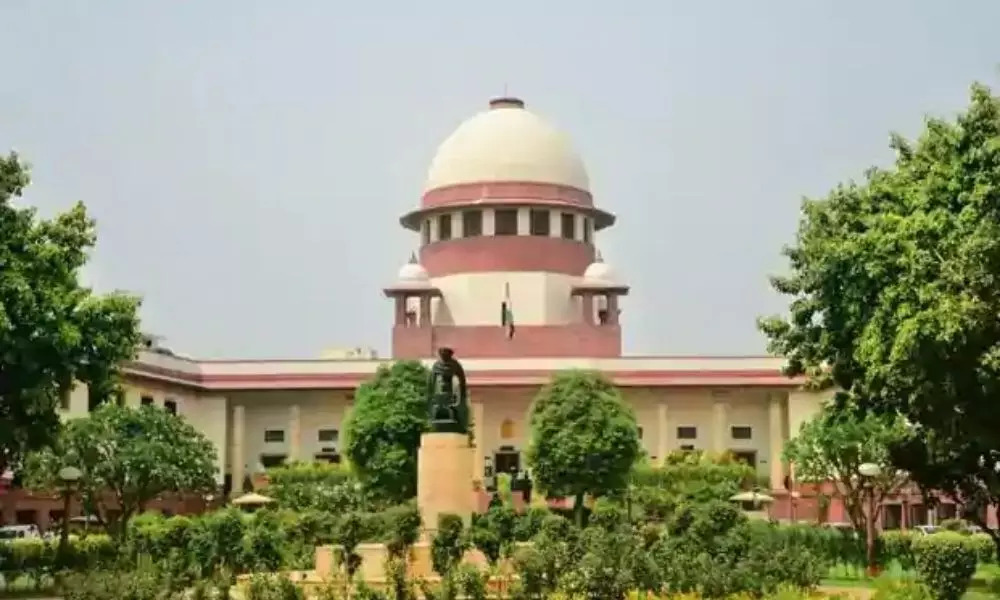Live
- Strict Protocols Set for Group 2 Exams in Wanaparthy District
- Delhi Police busts gang involved in cable theft on Delhi Metro Blue Line
- MP's Gita recitation programme finds place in Guinness World Records
- Pawan Kalyan Shines Globally as 2nd Most Googled Actor of 2024 Amid Busy Film, Political Career
- Disruptor of House is the chairman himself: Cong and INDIA bloc’s pointed remarks on No-trust notice
- IIIT-Bangalore to host computer vision conference ICVGIP 2024
- F1: Fernando Alonso ‘still dreaming’ of third world championship
- WI vs Bangladesh Watch Controversial Banter Between Shakib and King
- EFLU Celebrates Bharatiya Bhasha Diwas
- Manchu Manoj Submits Bond of Rs. 1 Lakh to Rachakonda Commissioner
Just In
SC: accused can't be held guilty for refusing to undergo test identification parade


SC: accused can't be held guilty for refusing to undergo test identification parade
The Supreme Court on Tuesday said that the finding of guilt cannot be based purely on the refusal of the accused to undergo a test identification parade (TIP).
New Delhi: The Supreme Court on Tuesday said that the finding of guilt cannot be based purely on the refusal of the accused to undergo a test identification parade (TIP).
A bench headed by Justice D.Y. Chandrachud and comprising Justices Indu Malhotra and Indira Banerjee, while deciding a criminal appeal against a murder conviction, said: "There is no specific provision either in the CrPC or the Indian Evidence Act, 1872, which lends statutory authority to an identification parade."
The bench noted that since a TIP does not constitute substantive evidence, the failure to hold it does not ipso facto make the evidence of identification inadmissible, and the court would look for corroborating material of a substantial nature before it enters a finding in regard to the guilt of the accused.
"An identification parade, in other words, tests the memory of the witnesses, in order for the prosecution to determine whether any or all of them can be cited as eyewitness to the crime", added the top court.
The prosecution had argued that the accused had refused to undergo the TIP, and that this was proof of their guilt. A law student of Maharshi Dayanand University, Rohtak, who was allegedly shot at by a group of assailants near the university.
Later, the victim succumbed to the injuries. The victim's father was an eyewitness to the shooting and claimed that he could identify the assailants, if they were paraded before him. The appellants, Rajesh and Ajay Hooda along with co-accused, were held guilty of murder by a sessions court in June 2012, and sentenced to imprisonment for life.
The appellants aggrieved with this order moved the high Court of Punjab and Haryana, which dismissed the appeals. The accused then moved the apex court.
The top court said: "In any event, as we have noticed, the identification in the course of a TIP is intended to lend assurance to the identity of the accused. The finding of guilt cannot be based purely on the refusal of the accused to undergo an identification parade."
The top court also doubted the presence of two key eye-witnesses at scene of the occurrence.
The top court noted that the ballistics evidence connecting the empty cartridges and the bullets recovered from the body of the deceased with an alleged weapon of offence is contradictory and suffers from serious infirmities. "Hence, in this backdrop, a refusal to undergo a TIP assumes secondary importance, if at all, and cannot survive independently in the absence of it being a substantive piece of evidence", said the top court.
The top court noted that one of the appellants in the case was also a co-accused with the victim in one of the cases. The top court ruled that the prosecution failed to establish its case beyond reasonable doubt and acquitted the appellants of the offence. The top court noted that the accused have already spent 12 years in prison for the offence.

© 2024 Hyderabad Media House Limited/The Hans India. All rights reserved. Powered by hocalwire.com






